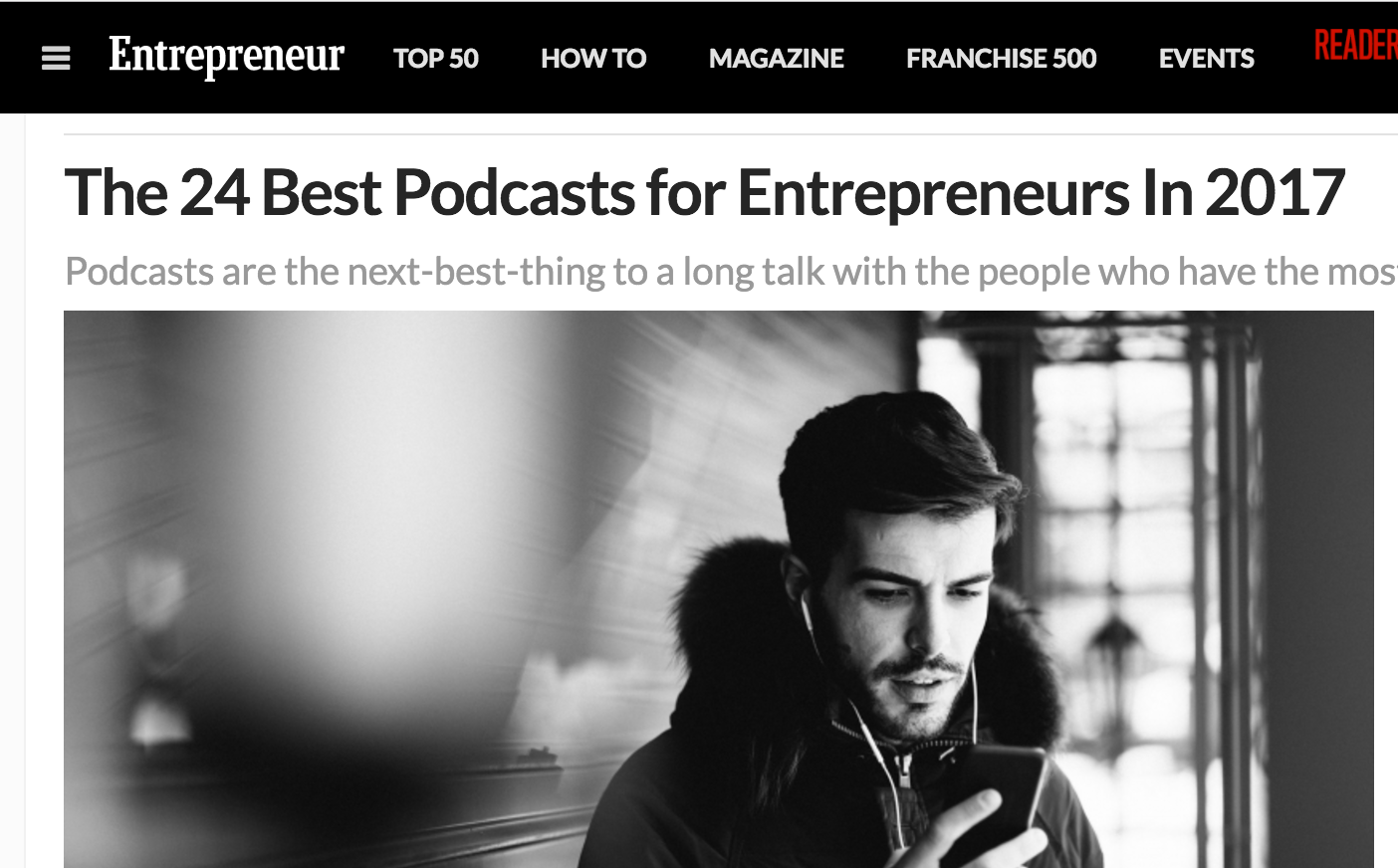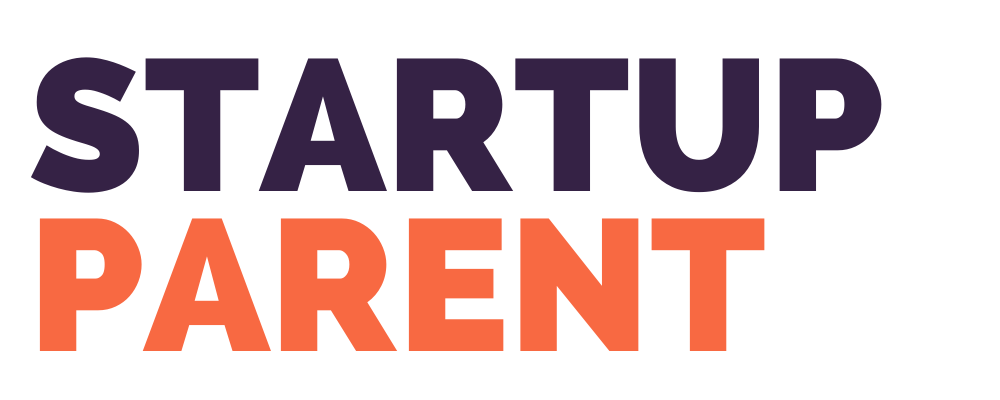In late December last year, Entrepreneur.com ran a piece called The 24 Best Podcasts for Entrepreneurs in 2017. When the piece was published, it ran face first into a classic bias problem: yet another “best entrepreneur lists” was disproportionately white and male.
Of the 24 podcasts listed, 22 of them were hosted by men.
We can’t keep having best entrepreneur lists that are all-male
Only one podcast (The Eventual Millionaire) — has a solo woman host. The second podcast (Startup) is co-hosted by Five Thirty Eight’s Lisa Chow. Of the twenty-four podcasts listed, there’s an equally imbalanced racial distribution, as well.
With regards to the racial and gender distribution, people were vocal in their responses about how astounding this was, and how, yet again, a round-up list of best things was so sorely different than what the actual entrepreneurial landscape actually looks like.
What do entrepreneurs actually look like?
Entrepreneurs are a rich mix of women, people of color, old, young, and more — yet posts like Mr. Mayberry’s perpetuate the idea that an “Entrepreneur” is defined solely as an ambitious white male.
In fact, the latter is more true: women and people of color tend to embrace entrepreneurship at a disproportionate rate precisely because the landscape of creating a new organization in your vision is so compelling.
One of my criticisms of the initial roundup of podcasts by Mayberry (who I reached out to, and ended up publishing a follow-up piece), is that this piece reads more as a round-up of Mr. Mayberry’s preferred podcasts within the startup niche than a list of podcasts that reflect the true entrepreneurial landscape.

Is this truly bias or just random chance?
One of the problems in pointing out this bias is the idea that “random chance” is to blame for a distorted distribution of representation. So let’s examine that: what is the actual chance that you could write an article with only one solo woman-hosted podcast in a lineup of 24?
In 2015, Mathematician Greg Martin created a statistical probability analysis that demonstrates how overwhelmingly improbable is is that a speakers’ lineup including only one woman and 19 men could be random. (The link above is to Lauren Bacon’s blog on her conversation with Greg dismantling the response that often sounds like “we just chose the best ones, and oops, they were all men.”)
In the lineup published by Entrepreneur, above, the probability of getting only one woman-hosted podcast out of twenty-four total podcasts is approximately a chance of 1 in 700,000.
Another great way of explaining the problem is the recent twitter storm by Sara Mauskopf about red wine and white wine. When you get a result that is so disproportionately skewed in one direction, it’s worth it to ask: where is this pattern coming from and why does it happen so often?
A wine analogy to explain why ‘lowering the bar’ rhetoric is wrong
The persistence of bias and what to do about it
Why do articles like this keep happening?
The answer is not “because men are better at podcasting than women,” which, sadly, is an actual response that many people shrug and say when this bias is pointed out. There are an overwhelming number of successful podcasts on entrepreneurship, business, and purpose hosted by women (On Being, Serial, Pivot, Profit/Power/Pursuit, or 2 Dope Queens come to mind).
As Mathematician Mr. Martin points out, reading the comment threads on gender disparity “reveals how truly dismissive and defensive people get when [it] is pointed out.”
Culturally and implicitly people still assume that words like “business,” “entrepreneurship,” and “startup” apply to men.
It’s an idea that’s taken for granted. This is why you don’t hear of the “Startup Podcast for Men” or the “Best Men Entrepreneurs” in a list of best podcasts. “Male” is the invisible, implicit, assumed word. When something is invisible (in this case, “male”), it is the “not” category (“women”) that is constantly proving the exception to the rule.
“The Mirror” — A short story example
There’s a story about what you see when you look in a mirror made famous by Michael Kimmel that helps to explain what’s true in a culture. You get up in the morning, you look in the mirror.
What do you see?
As the story goes, a white man will look in the mirror and say “I see myself.”
A woman will look in the mirror and say, “I see a woman.” And a person of color will look in the mirror and say, “I see an {ethnicity} woman,” for example. The ability to not think about or use the label in front of yourself is a luxury, Kimmel explains.
The labels we put on ourselves tell us how deviant from the norm we think it is. When a culture doesn’t say “Hey, this is a White Male Startup Podcast,” it’s because that is defined as the baseline, the norm.
When we say “entrepreneurs” we don’t always remember to include women in our mental models of what an entrepreneur looks like.
It’s a huge light on the problem: when we say “entrepreneurs” we don’t always remember to include women in our mental models of what an entrepreneur looks like. It’s why women don’t always feel as though that label includes them, and why there are more shows called Biz Chix, Girl Boss, and more.
And when writers make lists that yet again exclude women, it’s this classic embedded bias at work. It’s not an intentional slight of hand, or the gleeful exuberance of a writer that wants to ignore women. It’s an embedded, invisible—yet system-wide—problem of bias.
Please read this next part closely: I am not saying that all men write posts like this because they deliberately want to exclude women. I am saying that unless we become aware of embedded bias and actively seek to overcome it, we will continue to make lists like this by default.
Unless we become are aware of embedded bias and actively seek to overcome it, we will continue to make lists like this by default.
And when we do this, let’s be even more clear: it’s not just the women entrepreneurs and podcasters that miss out. We all collectively miss out on opportunity, money, insight, and innovation.
Women are the fastest growing group of entrepreneurs and are crushing it at making businesses and making money.
Here’s some great news: Women represent a growth market more than twice as big as China and India combined (according to HBR) and own or operate between 25–33% of all private businesses.When women are in leadership positions, company profits grow. When startup founder teams include women, the startups are more successful and more profitable.
Women-owned businesses represent the fastest growing group of entrepreneurs across the country — growing by 74% between 1997 and 2015 — a rate that’s 1.5 times the national average, according to this report. And Inc Magazine revealed that “businesses with a woman on the executive team are more likely to have significantly higher valuations at Series A (64 percent higher), and significantly higher valuations in their last funding round (49 percent higher).”
With such an impressive set of resumes, it begs the question: how is it that best-of entrepreneur lists keep excluding women when clearly they exist in spades?
Women are at the forefront of creating brilliant companies and innovations, they have immediate and practical wisdom to offer, and they are a huge, booming part of the entrepreneurial landscape.
Why we can’t afford to ignore this
What does this mean for entrepreneurs, investors, or media outlets who unknowingly perpetuate gender bias?
There are many successful podcasts by men and women that make a deliberate effort to promote a variety of voices across their interviews. Take Pat Flynn of Smart Passive Income, for example, or Srinivas Rao and the Unmistakeable Creative podcast, or the male founders of ZenBusiness (previously known as Fizzle) who recognized their bias and searched to add a Steph Crowder to the show in 2015 to make sure they weren’t just ‘three dudes talking business.’ (The Fizzle Show has had a few different hosts over the years with anchors Chase Reeves and Corbett Barr running the ship, and their new voices have kept the podcast fresh and the narratives changing.)
There are entrepreneurs and journalists out there actively working to overcome the subtle (and blatant) sexism that exists in our culture. You’re either doing something about it, or you’re not.
And consider the upside to you: consciously paying attention to including women’s voices represents a huge opportunity.
Plenty of podcasters, writers, and innovators know that this is a resource and market that’s consistently overlooked.
What does it mean to be the first to find something, or to invest in something new? What does it mean when you think something like Spanx (or Bevel) won’t work, and you miss out on a billion-dollar industry innovation because you didn’t think that the problem mattered?
And in my own life as a personal practice, when gender disparity is skewed in an overwhelmingly homogeneous direction (like the one on Entrepreneur.com that got me fired up to write this essay), I get up, write letters, and send messages directly to the writers and to the podcast hosts explaining why this is actually a statistical improbability, and what they can do to change it.
I’ve emailed so many people so often that I spent a weekend with my partner building www.morewomensvoices.com to make it ridiculously easy to find more women’s voices to feature in your writing, podcasts, and on stage.
Mr. Mayberry, to his credit, responded to his critics and acknowledged the skew and immediately published a follow-up article listing 24 exceptional women-hosted podcasts to listen to in 2017.
There are an enormous number of successful women entrepreneurs and woman-led podcasts about entrepreneurship, growth, and life. We can’t keep writing articles that ignore them, or we’ll miss out on the inventions, innovations, and wisdom to be learned from these important entrepreneurial voices.
Thank you
Tara Sophia Mohr, Steph Halligan, Barrett Brooks, Alex Peck, Elisa Doucette, Matt Hunckler and Mia Scharphie for reading drafts and making comments on these ideas and this piece. And thank you to Jessica Kupferman and all of the women in She Podcasts for recommending so many women’s voices to add to the lists!

